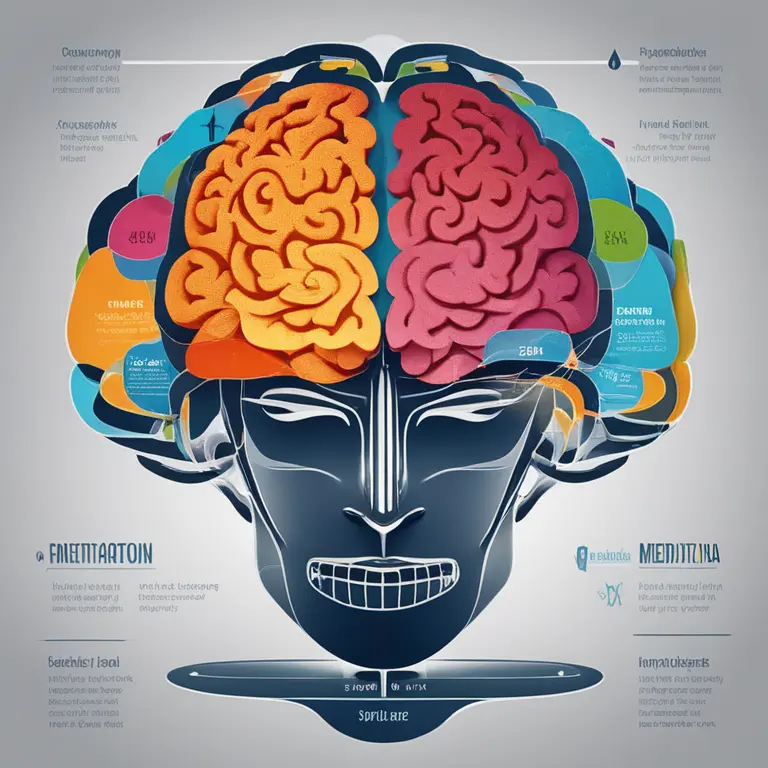
The Brain-Altering Benefits of Meditation
Explore how the practice of meditation can induce profound changes in the brain, impacting mental health and cognitive functions.
article by Hina Kurosawa
Meditation's Effect on Brain Structure
Meditation has been traditionally linked to spiritual and relaxation benefits, but recent scientific endeavours have unearthed its profound impact on brain structure. Studies utilizing MRI scans reveal that consistent meditation can increase the density of gray matter, especially in regions associated with memory, learning, and self-awareness. Intriguingly, areas like the amygdala, which play a role in the regulation of emotions, appear less dense in seasoned meditators, signifying a potential reduction in stress responses. These structural shifts suggest that meditation does not merely alter our state of mind temporarily but cultivates lasting changes within the brain's architecture.

Improving Focus and Attention
One of the most celebrated effects of meditation is the enhancement of focus and attention. The regular practice of mindfulness meditation strengthens the brain's ability to concentrate on the present moment, as evidenced by the stabilized activity in the prefrontal cortex and the decrease in mind-wandering. Neuroscientists have observed that meditators can better control the brain's default mode network (DMN), which is active during aimless thought processes and daydreaming. Tuning out from the DMN not only sharpens focus but also promotes a sense of tranquility and reduces the propensity for rumination.

Neuroplasticity and Cognitive Agility
Meditation's role in bolstering neuroplasticity—the brain's capacity to form new neural connections—has garnered considerable attention. This process underlies our ability to adapt to new information and experiences. By engaging in regular meditation, individuals may improve cognitive agility, allowing them to more effectively navigate complex tasks and problem-solving scenarios. Enhanced neuroplasticity also contributes to a more resilient mindset, equipping individuals to better handle life's obstacles and stressors.

Regulating Emotional Health
In addition to cognitive benefits, meditation serves as a formidable ally to emotional health. Regular practitioners often report heightened levels of compassion and empathy, thanks to increased connectivity between brain regions responsible for understanding others’ emotions and inhibiting automatic responses. This can also equate to better emotion regulation, with studies showing that meditators experience quicker recovery from negative emotional events, underscoring the therapeutic potential of meditation in mental health care and emotional well-being.

Slowing Cognitive Decline
Another astounding benefit of meditation is its possible role in decelerating age-related cognitive decline. Senior citizens who engage in consistent mind-training exercises display sharper memory skills and greater volume in certain brain regions compared to those who do not. Given the search for lifestyle practices that contribute to healthier aging, meditation emerges as a promising intervention to keep the mind vigorous and ward off the effects of cerebral aging.
Encouraging Healthy Brain Chemistry
Meditation also exercises influence over the brain's chemical landscape. Stress reduction through meditation is partially attributed to lower levels of cortisol, a stress hormone. Additionally, the practice has been linked to an increase in the production of gamma-aminobutyric acid (GABA), which serves as a calming neurotransmitter, and endorphins, the body's natural mood elevators. These chemical changes not only enhance mood but foster an overall sense of wellbeing.
Published: 1/14/2024
Modified: 1/15/2024
More predictions
Come back here soon to learn more about yourself and your future


Mindfulness & Meditation: A Guide for High Schoolers
Discover the benefits of mindfulness meditation tailored for the hectic life of high school students, and learn simple strategies to incorporate it into the daily routine.


Mindfulness Meditation: A Handbook for High Schoolers
Discover how mindfulness meditation can benefit high school students, enhancing focus, reducing stress, and promoting overall well-being.


Mindfulness Meditation Basics for First Graders
Introducing foundational mindfulness meditation practices to instill calm and focus in first-grade students.